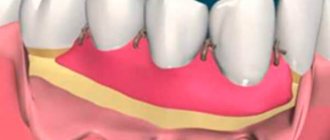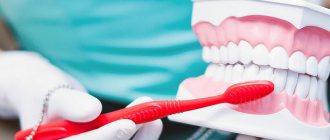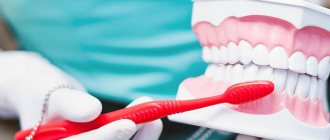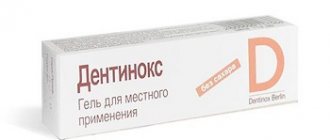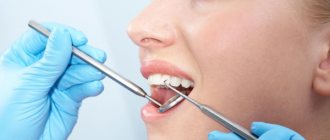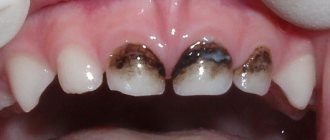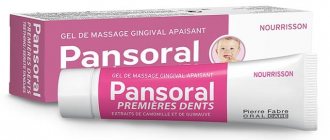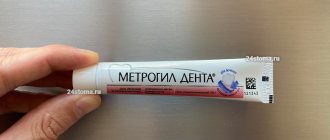| [organizational and legal form, name of organization, enterprise] | I approve [position, signature, full name of the manager or other official authorized to approve the job description] [day month Year] M.P. |
Job description of a dental hygienist [name of organization, enterprise, etc.]
This job description has been developed and approved in accordance with the provisions of the Labor Code of the Russian Federation and other regulations governing labor relations in the Russian Federation.
Dental hygienist: what he does and what he treats
The oral cavity is an exceptional ecosystem for the vital activity of microflora, which can cause diseases of the teeth and surrounding tissues. One of the main reasons influencing the composition of microflora is the hygienic condition of the oral cavity. Mineral deposits and soft plaque are an excellent breeding ground for bacteria. There are many medical specialties in dentistry, but only a specialist hygienist can clean your teeth perfectly and restore your smile’s attractiveness.
Personal qualities
Before enrolling as a full-time or part-time student at a university, you need to find out where to study and what personal qualities will be needed in your future profession. Their presence or absence will help determine the appropriateness of choosing an applicant.
Required qualities:
- accuracy;
- pedantry;
- politeness;
- responsibility;
- determination;
- communication skills;
- persistence;
- altruism.
What is a dental hygienist?
A dental hygienist is a specialist with a higher or secondary specialized education who has received the specialization “Preventive Dentistry” or “Dental Hygienist”. This is a doctor who professionally knows all aspects of proper oral care.
Responsibilities within the competence of a dental hygienist:
- preventive examination, assessment of the condition of the oral cavity;
- primary diagnosis of periodontal and dental diseases;
- drawing up an individual oral care program;
- providing assistance in selecting dental hygiene products;
- teaching patients how to care for orthodontic and orthopedic systems;
- choice of technology and removal of dental plaque;
- polishing minor defects (irregularities) of fillings;
- strengthening enamel with special pastes;
- explanation of the rules for brushing teeth;
- Providing consulting assistance in their specialization to dentists of other profiles.
General provisions
1.1. A dental hygienist is a specialist.
1.2. A person with a secondary medical education in the specialty “Preventive Dentistry” is appointed to the position of dental hygienist.
1.3. A dental hygienist is appointed and dismissed by the chief physician (director) of the institution.
1.4. The dental hygienist must know:
— laws, government regulations and other regulatory legal acts that determine the development of healthcare and relate to the provision of dental care to the population;
— principles of medical examination of the population;
— principles of medical ethics and deontology;
— principles of organizing preventive dental care for children and adults;
— methods and means of preventing dental diseases;
— basics of epidemiology, etiology and pathogenesis, diagnosis and general principles of treatment of major dental diseases;
— indices for recording the intensity of caries and periodontal diseases, the hygienic state of the oral cavity;
— methods and means of individual and professional oral hygiene, features and organization of teaching oral hygiene to children in organized children's groups;
— methods of dental education of the population;
— safety regulations, industrial sanitation and fire protection;
- [fill in what you need].
1.5. During the absence of a dental hygienist (vacation, illness, etc.), his duties are performed by a person appointed in the prescribed manner.
1.6. [Enter as appropriate].
What is dental professional hygiene
C
This is a set of measures aimed at preventing caries and treating inflammatory diseases of the periodontal soft tissues. It is not always possible to completely remove layers on your own at home. They are present not only on the visible surface of the segments, but also form in the subgingival part of the crown and between the teeth. Therefore, it is impossible to remove them from hard-to-reach areas with a simple brush.
When performing work, a dental hygienist uses special dental instruments (mirrors, hooks, brushes, tweezers) and modern technologies. The most popular methods are the crushing of mineral deposits with an ultrasonic scanner and the air-abrasive method of removing soft, hard deposits using sandblasting equipment.
Prospects for the profession
After graduating from a technical school or college, you can practice independently in budgetary organizations or together with a dental therapist in private clinics.
After graduating from a higher educational institution, you can work as a general dentist (therapist or hygienist) or obtain a narrower specialization as an orthodontist, prosthetist, surgeon, etc. You can work in public and private clinics. At the same time, no one forbids opening your own office. A good young doctor with a clear head and golden hands will quickly “grow” with a regular clientele. The only, but very significant, obstacle on this path is the material side of the issue. Opening even a small dental office requires a significant initial investment.
If you still have even the slightest doubt that the profession of a dental hygienist is right for you, then we strongly recommend taking a career guidance test from Profgid . It costs mere pennies, and at the same time allows you to avoid mistakes that can go in the wrong direction and cripple your entire life. Find out more >>
Stages of hygienic teeth cleaning
Using innovative technologies, the dental hygienist achieves maximum results without causing pain to the patient. The procedure is carried out in several stages:
- Anesthesia with local anesthetics. Used for increased tooth sensitivity or at the request of the patient.
- Examination of the oral cavity, drawing up a teeth cleaning program.
- Removing hard plaque using an ultrasonic unit. High-frequency sound waves create vibrations that reach the border of the stone and the enamel. The impact breaks the deposit into small fragments. The natural tissues of the tooth are not harmed.
- Cleaning remaining plaque with a jet of water containing fine powder, supplied under high pressure from the nozzle of the sandblaster nozzle. The procedure not only removes plaque, but also polishes the surface of the segments in a row and returns them to their natural color.
- Polishing with special pastes. Teeth polished with an abrasive preparation are less susceptible to the formation of deposits, which prevents the development of caries.
- At the end of the procedure, the dental hygienist performs remineralization with a special drug that reduces the sensitivity of the cervical area of the units to irritants.
Who is the profession suitable for?
Like any medical specialty, the profession of a dental hygienist requires a special character. This is working with people who, due to illness, often become irritable and moody. To avoid conflicts, you must have an understanding of the basics of psychology and be able to establish contact with patients.
So, those who plan to devote themselves to preventive, that is, prophylactic dentistry, need to:
- be able to find a common language with patients;
- do not suffer from excessive disgust;
- be inquisitive and have a desire to continuously learn;
- have stress resistance;
- do not get lost in case of emergency situations.
When to see a dental hygienist
The World Dental Organization recommends professional hygiene with a hygienist twice a year. This preventive measure makes it possible to prevent inflammation of hard tissues at the stage of stain formation.
You need to make an appointment with a hygienist in the following cases:
- An independently made decision for the purpose of prevention.
- When calcareous deposits and bacterial plaque are detected on the teeth.
- If you smoke a lot, drink coffee, tea: to remove pigment from the enamel and give it a natural color.
- Before prosthetics, in order to adequately select the shade of the crowns.
- If you have braces in your mouth (in this case, you should visit the dental hygienist every 3 months).
- By referral from a dentist before treatment of caries and its complications.
- Before implantation of artificial roots, in order to reduce the risk of infection.
- Before any invasive interventions in the oral cavity.
Description and characteristics of the profession
A dental hygienist is a medical specialist who can work both independently and assist dentists (orthodontists, periodontists, surgeons, etc.). The main goal of his work is the prevention of diseases of the oral cavity and teeth.
The dental hygienist must:
- have a good understanding of the anatomy and physiological processes of the body as a whole;
- carry out preventive measures aimed at maintaining oral health;
- instruct patients on hygiene procedures;
- perform diagnostic and treatment procedures provided for by the specialty;
- master first aid techniques in case of critical situations (an allergic reaction in a patient, a sharp drop in blood pressure, etc.);
- know the causes and symptoms of dental pathologies;
- work with the latest technical equipment and instruments;
- understand the mechanism of action and effect of prescribed drugs.
Benefits of visiting a dental hygienist
Professional dental hygiene identifies and eliminates:
- putrid odor from the mouth;
- foci of inflammation in the periodontium;
- identify hidden, initial caries, pulpitis, periodontitis;
- improve the condition of the gums;
- eliminate enamel demineralization;
- remove pigmented plaque;
- eliminate rocky, soft layers;
- reduce bleeding gums and tooth sensitivity to external irritants.
You can carry out high-quality professional oral hygiene in dentistry on Otradnoye. We employ highly qualified dental hygienists who perform the full range of services within the competence of this profession. We work on original imported equipment, with certified products that have passed quality tests. Make an appointment with the clinic by calling 8 (499) 202 1000, or fill out the form on the website, we will call you back.
Specialties, universities and Unified State Exam subjects
Medical colleges and universities prepare dental hygienists:
- colleges - specialty 02/31/06 “Preventive Dentistry”;
- universities - specialty 05/31/03 “Dentistry”.
Education at the college is conducted only on the basis of 11 classes. Preparation period – 1 year 10 months. Admission is based on a certificate competition.
To become a university student, you will need Unified State Examination results in the Russian language, mathematics, biology and chemistry or physics. Studying at the university will take 5 years, another two years will be spent on residency.
You can only get an education in colleges and universities on a full-time basis.
There are faculties of dentistry in all multidisciplinary medical universities and in specialized Russian universities that train medical workers. For example, in Moscow it is:
- Moscow State Medical and Dental University named after. A.I. Evdokimov.
- First Moscow State Medical University named after. THEM. Sechenov.
- Peoples' Friendship University of Russia.
- Russian National Research Medical University named after N.I. Pirogov and many others.
When deciding where it is better to get an education as a dental hygienist, you should take into account the indisputable fact: graduates of higher educational institutions are more willingly hired for well-paid vacancies in private medical centers and clinics.
Where to get training
In addition to higher education, there are a number of short-term training on the market, usually lasting from a week to a year.
The Medical University of Innovation and Development invites you to take distance courses for retraining or advanced training in the field of “Hygienist” to receive a diploma or state certificate. Training lasts from 16 to 2700 hours, depending on the program and your level of training.
The Interregional Academy of Additional Professional Education (MADPO) provides training in the specialization “Hygiene and Sanitation” and issues diplomas and certificates.
The Institute of Professional Education "IPO" invites you to take distance courses in the direction of "Food Hygiene" (there are options 256, 512 and 1024 academic hours) to receive a diploma or state-issued certificate. We have trained more than 8,000 graduates from almost 200 cities. You can undergo external training and receive interest-free installments.
